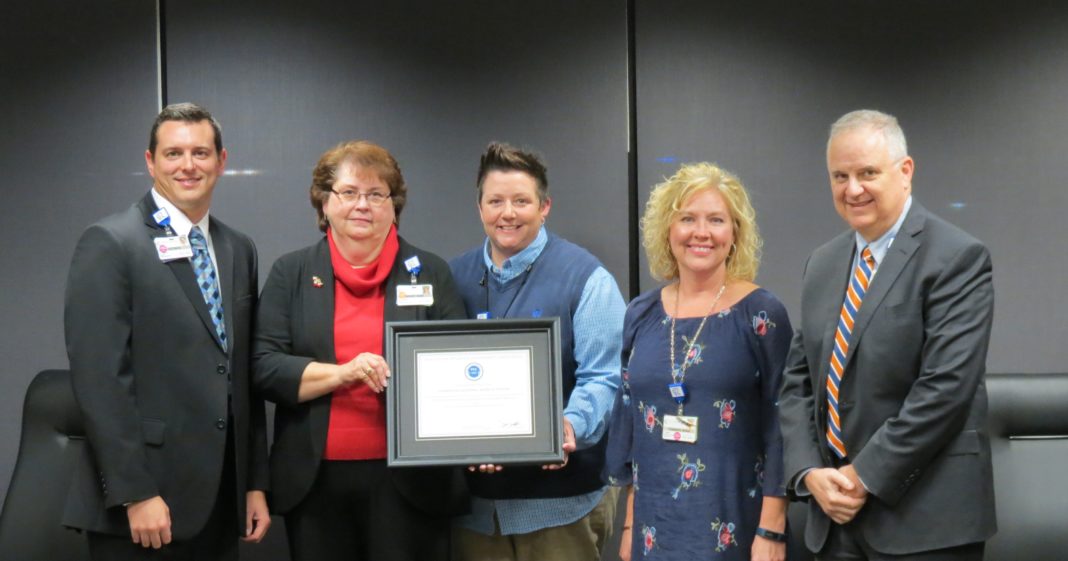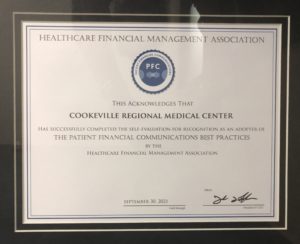
By Michelle Price
UCBJ Managing Editor
COOKEVILLE – Cookeville Regional Medical Center (CRMC) has achieved recognition as an Adopter of the Healthcare Financial Management Association’s Patient Financial Communications Best Practices®. As a Best Practices Adopter, CRMC demonstrated that it follows nearly 100 best practices covering all aspects of financial interactions that take place in a variety of care settings. CRMC is only the second hospital in Tennessee to be awarded this elite recognition.
“In a time when patients are paying more out-of-pocket expenses for their health care, the financial conversations we have with patients have never been more important,” said Steve Ramey, CFO at Cookeville Regional. “We have taken steps to ensure that patients are treated with compassion and respect in financial matters, and this recognition confirms that.”
When Ramey heard about this elite recognition, he immediately challenged his team to achieve it. Patrick Farmer, director of patient registration; Mary Jane Howard, director of patient financial services; Michelle Peabody, patient financial POS supervisor; and Tommye Rena Wells, Sr. VP of Finance worked together developing training tools and checklists for employees while standardizing processes for consistency.
Since registration is one of the first contacts a patient has with the hospital, checklists were developed to train employees about how insurances pay the facility, how they process claims and where that falls in for patients, so they could better educate those patients on where their money is going.
 One of the best practices Cookeville Regional has in place, and has for many years, is the point-of-service (POS) team that is there to have a conversation about the cost of service with the patient before they receive it.
One of the best practices Cookeville Regional has in place, and has for many years, is the point-of-service (POS) team that is there to have a conversation about the cost of service with the patient before they receive it.
“We understand it can be overwhelming financially when you or a loved one needs care. Patient financial services provides patients with the opportunity to reach out and see what all is entailed in the cost before ever having their procedure performed,” said Peabody. “The point-of-service team is available to talk with patients and provide cost estimate information based on the patient’s insurance and CRMC’s contracts.
“We meet with labor and delivery patients, those receiving outpatient services, surgeries, and imaging as well as patients who are in the emergency department or pass through the emergency department and are admitted to the floor. We also offer financial counseling to help the patients in making financial decisions with their healthcare.”
Changes in the healthcare climate mean increasing copays and deductibles for many individuals, adding further stress to an already tense experience.
“It’s a big belief of mine, that in healthcare right now, copays and deductibles are increasing for individuals, so the individual’s portion of the bill has gotten a lot bigger,” added Ramey. “I believe that it’s better to let people know up front what their expected bill is.
“It’s kind of like leaving your car at the mechanic to be fixed without ever knowing what the bill is, and you go down there and get shocked. They always call you first and tell you what the repair is going to cost before you give them the go ahead,” explained Ramey. “So, we want people to be aware up front and not get a bill a month later and say, ‘oh my God’ or something of that nature. We want people to be informed up front so that they know what they are dealing with.”
Unlike some of the big city hospitals, CRMC does not require a percentage of the total cost down prior to services being performed. Patient financial services is available to help the patient in planning with payment plans or in exploring alternative options when the patient’s financial situation requires it.
“We’ve had one or two cases, not a lot, where a physician has a patient that says ‘I can’t afford this’ and we couldn’t help them through another method like a charity plan, and the physician has actually said there’s a different way I can do this that is cheaper and went that route,” added Ramey. “It doesn’t happen much, but it has a couple of times.”
Cookeville Regional joins a select group of hospitals, health systems, and physician practices that have received this first-of-its-kind, national recognition. A blue-ribbon task force developed these best practices to help improve communication between healthcare providers and consumers about healthcare-related financial matters.








